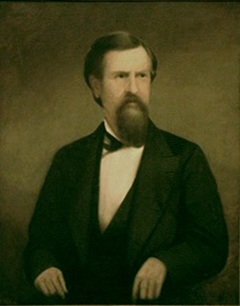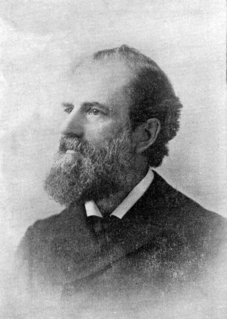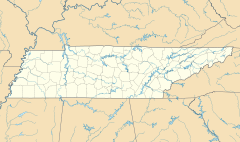
Vanderbilt University is a private research university in Nashville, Tennessee. Founded in 1873, it was named in honor of shipping and rail magnate Cornelius Vanderbilt, who provided the school its initial $1-million endowment; Vanderbilt hoped that his gift and the greater work of the university would help to heal the sectional wounds inflicted by the Civil War.

John Crowe Ransom was an American educator, scholar, literary critic, poet, essayist and editor. He is considered to be a founder of the New Criticism school of literary criticism. As a faculty member at Kenyon College, he was the first editor of the widely regarded Kenyon Review. Highly respected as a teacher and mentor to a generation of accomplished students, he also was a prize-winning poet and essayist.

Montgomery Bell Academy (MBA) is a preparatory day school for boys in grades 7 through 12 in Nashville, Tennessee.

James Davis Porter was an American attorney, politician, educator, and officer of the Confederate Army. He served as the 20th Governor of Tennessee from 1875 to 1879. He was subsequently appointed as Assistant Secretary of State during President Grover Cleveland's first administration, and Minister to Chile in Cleveland's second administration.

Samuel Yellin (1884–1940), was an American master blacksmith, and metal designer.

Peabody College of Education and Human Development is one of ten colleges and schools that Vanderbilt University comprises. Peabody College provides graduate, undergraduate, and professional education. Peabody's faculty are organized across five departments, and include researchers in education, psychology, public policy, human development, special education, educational leadership, and organizational development. Peabody has a long history as an independent institution before becoming part of Vanderbilt University in 1979. The college was ranked fourth among graduate schools of education in the United States in the 2021 rankings by U.S. News & World Report. It was ranked as the top graduate school of education in the nation during the 2009, 2010, 2011, 2012, and 2013 editions of those rankings.
University of Nashville was a private university in Nashville, Tennessee. It was established in 1826 as Cumberland College. It existed as a distinct entity until 1909; operating at various times a medical school, a four-year military college, a literary arts college, and a boys preparatory school. Educational institutions in operation today that can trace their roots to the University of Nashville include Montgomery Bell Academy, an all-male preparatory school; the Vanderbilt University Medical School; Peabody College at Vanderbilt University; and the University School of Nashville, a co-educational preparatory school.

John Berrien Lindsley (1822–1897) was an American Presbyterian minister and educator in Nashville, Tennessee.

The Blair School of Music, located in Nashville, Tennessee, provides a conservatory-caliber undergraduate education in music performance, composition, or integrated music studies within the context of a major research university, Vanderbilt University. Blair also provides music lessons, classes and ensembles to over 800 precollege and adult students each semester. Blair is the youngest and smallest of Vanderbilt's ten constituent schools and colleges.
Dr. Henry Nelson Snyder (1865–1949) was an American Methodist educator and author. He served as president of Wofford College from 1902 until his retirement in 1942.
The Algernon Sydney Sullivan Award is an award presented to graduating seniors, alumni, and faculty of selected colleges and universities in the Southern United States for excellence of character and service to humanity.
The Vanderbilt Television News Archive, founded in August 1968, maintains a library of televised network news programs. It is a unit of the Jean and Alexander Heard Library of Vanderbilt University, a private research university located in Nashville, Tennessee. It is the world's most extensive and complete archive of television news.

The Jean and Alexander Heard Library system is made up of several campus libraries at Vanderbilt University. These include Eskind Biomedical Library, Central Library, Divinity Library, Alyne Queener Massey Law Library, Walker Management Library, Anne Potter Wilson Music Library, Peabody Library, Sarah Shannon Stevenson Science & Engineering Library, Special Collections and University Archives, and the Television News Archive. It also houses the world's most extensive and complete archive of television news from 1968 to the present day.
The following is a timeline of the history of the city of Nashville, Tennessee, United States.

The Home Economics Building on the campus of Vanderbilt University is a historic structure in Nashville, Tennessee.
Adrian Van Sinderen Lindsley (1814–1885) was an American lawyer, businessman and politician from Tennessee.

Joseph Peterson was an American psychologist and a past president of the American Psychological Association (APA).

Lindsley Hall is a historic building in Nashville, Tennessee. Built in the antebellum South as the main building of the University of Nashville, it served as a Union hospital during the Civil War. It became the Nashville Children's Museum in 1945. In 1974 the museum moved to a new facility at 800 Fort Negley Boulevard, became the Cumberland Science Museum and is now known as the Adventure Science Center. The building is once again called Lindsley Hall and is used by the City of Nashville for Metro Government offices.

William Harold Payne (1836–1907) was an American educator and translator. As professor of the Science and Art of Teaching at the University of Michigan in 1879, he was the first university professor of pedagogy in the United States. He served as the chancellor of the University of Nashville and the president of Peabody College from 1887 to 1901.
John Edwin Windrow was an American educator. He became known as "Mr. Peabody" for his five-decade career at Peabody College in Nashville, Tennessee. He was a critic of Nashville's social ills and intellectual segregation.
















